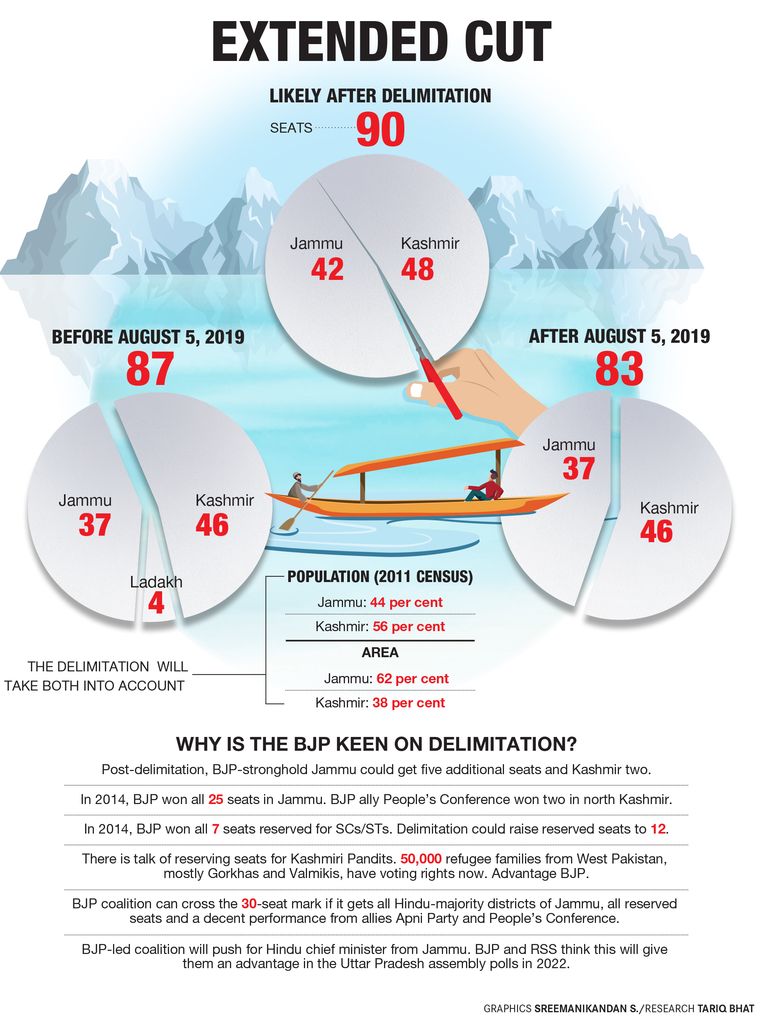There were great expectations from Prime Minister Narendra Modi’s June 24 meeting in Delhi with 14 leaders from Jammu and Kashmir. The much-hyped meeting, which happened nearly two years after the Union government voided Article 370 and redrew the state into two Union territories, was expected to pave the way for the long-delayed assembly polls. But now, the dominant feeling, especially in the valley, is that the meeting achieved precious little. In Jammu, which had witnessed celebrations after Article 370 was voided, there is now growing unease over the BJP’s refusal to commit to a timeline for restoring statehood.
“People are disappointed because nothing positive has emerged from the meeting,” said Bashir Ahmed, a houseboat owner. According to him, Kashmiris have been suffering since the 2014 floods. “Whatever business we had has been disrupted by the pandemic,” said Ahmed.
Basheer Waza, a chef, said the situation was hopeless. “Inflation and unemployment have been rising for the past two years,” he said. “I am struggling to make ends meet. The situation was better before Article 370 was removed.”
In Jammu, people are worried over the delay in restoring statehood. Prominent activist Zorawar Singh said the BJP must not procrastinate on the matter. “After delimitation [of assembly seats], statehood must be restored,” he told THE WEEK. “We need it back, so that our own people can run the administration.” Anil Suri, former president of the Jammu Chamber of Commerce and Industries, said assembly polls could wait. “First, the statehood needs to be restored; then elections can be held,” he said.
There is resentment in Jammu over the way the BJP has handled issues. “Jammu people are nationalists,” said a trader. “We don’t want to hit the streets in protest because that would strengthen the separatists in Kashmir. But, after J&K became a Union territory, Jammu has suffered immensely.”
The Union government deems that the Delhi meeting has revived the stalled political process. Also, it has served to send a message to the international community that the situation in Jammu and Kashmir is returning to normal.
But the parties in Kashmir have apparently gained very little. During the meeting, the Congress and other opposition parties were united in demanding the restoration of statehood without further delay. But Modi and Union Home Minister Amit Shah linked the matter to the planned delimitation of assembly constituencies in the run-up to the polls. This had the Gupkar Alliance—a five-party alliance led by National Conference chief Farooq Abdullah—distraught.
On his part, Modi spoke of reducing both “dil ki doori, Dilli se doori”—distance of the heart and distance from Delhi. But he offered no concession on the statehood issue. According to a leader who attended the meeting, Modi seemed keen on completing the delimitation process so that elections could be held.
CPI(M) leader M.Y. Tarigami, chief spokesperson of the Gupkar Alliance, told THE WEEK that the meeting only added to a long list of disillusionments. If parties can wait for statehood, said Tarigami, then they can wait for elections as well. “We don’t want a truncated state; we want the state that existed earlier. That will give credibility to the electoral process,” he said.
According to Prof Bhim Singh of the J&K National Panthers Party, only Abdullah and Peoples Democratic Party president Mehbooba Mufti raised the matter of reinstating Article 370. “Congress leader Ghulam Nabi Azad said his party will not talk about Article 370 as the matter is sub judice,” said Singh.
According to sources, when Abdullah began speaking about restoring Article 370, former deputy chief minister and Congress leader Muzaffar Hussain Baig interrupted him, reminding him that the Supreme Court was considering the matter. “After that, Abdullah didn’t raise the issue,” said one source.
Mehbooba reportedly pitched for talks with Pakistan and demanded that political prisoners be released. On May 5, separatist leader Muhammad Ashraf Sehari had died in detention in Jammu. His two sons were arrested after slogans were raised at his funeral. People’s Conference leader Sajjad Lone, who quit the Gupkar Alliance last year, turned emotional while recalling how his father was killed by militants, said sources.
With the leaders failing to play hardball with Delhi, there are growing voices of dissent in the NC and the PDP. Veteran NC leader Aga Syed Ruhullah said the meeting benefited only the BJP. “It was a photo opportunity for J&K leaders with Modi,” he said. “I don’t advocate statehood without the restoration of Article 370, but the leaders couldn’t get even that assurance.”
There are demands that the Gupkar Alliance boycott the polls. Asked whether it would benefit the BJP, Ruhullah said, “What kind of a democracy is it where elected members have no power and a Union government-appointed—and not elected—lieutenant governor can veto everything?”
While there is resentment among the NC cadre, party workers are also mindful that Abdullah is under pressure from the Enforcement Directorate, which is inquiring into the alleged misappropriation of 043 crore in the Jammu and Kashmir Cricket Association.
Mehbooba, too, is facing an inquiry in a case related to money laundering. Her bank accounts have been frozen and her passport, along with that of her mother, have been blocked. Waheed Parra, a young PDP leader and Mehbooba’s confidant, is in the custody of the National Investigation Authority on charges of providing funds to separatists and contacting militants in Pakistan. Apparently, Mehbooba agreed to attend the meeting in Delhi only after the Union government released two senior PDP leaders from detention as a goodwill gesture.
With the meeting failing to make any real headway, public anger at political leaders has only increased. Ghulam Nabi, a retired government employee, said the leaders had gone to Delhi “seeking re-employment”. “Currently, they are jobless. So they will do anything to get themselves re-employed,” said Nabi. “If they had cared for the people, they would not have submitted to the BJP.”



